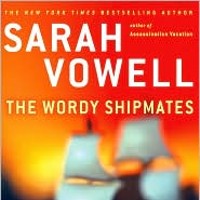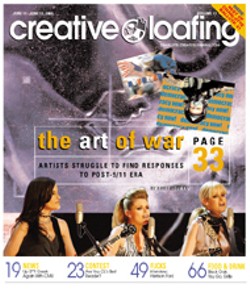Page 3 of 4
Heer also helped organize the recent "Homeland Insecurity" event at Off Track Productions (the old red building on 8th Street in uptown). In addition to works from local artists like William Wyler and Little Shiva, the event also featured spoken word performances and performance art, including the mock interrogation of patrons by actors clad as FBI agents.
Artists have rallied overwhelmingly against the war, but judging from their responses, they've reacted more often with their guts than their heads. Last March, more than 1,000 staged readings of Aristophanes' anti-war comedy Lysistrata were held in 59 countries. In the ancient play, the women of Athens withhold sexual favors until their men resolve to stop waging war: "No peace, no piece," indicates the low-aiming level of the play's puns. Works like The Lysistrata Project are more about a shared desire to say "War is bad" than to contribute to anything resembling a real-world debate.
Not all artists and entertainers are anti-war, though. Country music primarily supports the patriotic line, as the Dixie Chicks learned to their regret. And comedian Dennis Miller offered an explicit call to arms on his HBO concert "The Raw Feed," first broadcast in April: "Sand and heat make glass, and when we're done with Iraq, it should look like Superman's dad's apartment on Krypton."
But overall, pro- and anti-war art, like 9/11 memorials, proves similarly simplistic. Each expresses sentiments that can fit just as comfortably on a bumper sticker as a piece of propaganda.
With the Iraq war over, artists are challenged to shift from propagandistic statements to the human causes and consequences of the recent conflicts. But the wounds may still be too fresh to try and comprehend the perspective of our enemies.
In the post-9/11 era, artists risk condemnation by acknowledging that our adversaries even have opinions -- let alone sympathetic ones. Country rocker Steve Earle was all but accused of treason for his song "John Walker's Blues," which takes the point of view of "American Taliban" John Walker Lindh, a young man raised on MTV who finds meaning in Allah: "Sometimes a man has to fight for what he believes," Earle writes with deliberate -- and misunderstood -- ambiguity.
Perhaps Earle suffered because he named Lindh explicitly. No one criticized Bruce Springsteen's song "Paradise," written in the voice of an anonymous suicide bomber ("I hold my breath and close my eyes / And I wait for paradise").
One of the sharpest remarks about the United States' relationship with the rest of the world appeared in the unlikely venue of South Park. In a November 2001 episode, the show's four young anti-heroes are confronted by a quartet of impoverished Afghan boys, one of whom snarls, "Don't you know that half the world hates you?"
When one of the Americans asks why, he's told, "Because you don't know that half the world hates you!"
The South Park script borrowed that line from L.A. Weekly columnist John Powers, and its attitude continues to echo in our mass entertainment. Artists can exert influence by capturing the lives of people in other cultures and showing, for instance, how America looks to someone peering through a burkha. The most effective works emphasize common humanity and realize that "My country, right or wrong" and "My country, always wrong" both put restrictions on the truth.
Yet the medium with the most resources and the most power for showing other perspectives has been absent, like a draft dodger in the cultural conflict. Hollywood has all but ignored the post-9/11 era, with The 25th Hour and the film adaptation of The Guys being exceptions.
Big-budget movie producers have avoided contemporary, culture-crossing themes in favor of more comic book and period-piece screen stories. After all, who would want to invest $100 million in a movie that risks a box-office backlash on the scale of the angry response to Michael Moore's Oscar speech, or the Dixie Chicks boycott? (Although the Chicks' fans apparently either agree with them or just don't care about the group's politics, since they've been playing to sold-out houses during their current tour. Hollywood, take note.)
An exception to Hollywood's timidity is Tears of the Sun, which plays it commercially safe by making an implicit case for US interventionism. Bruce Willis and his troops are sent to rescue a handful of Americans during a Nigerian civil war. He's ordered to leave victimized natives to fend for themselves, but Willis disobeys in order to save Nigerian innocents from bloodthirsty rebels. Tears of the Sun has an uncomfortable subtext, though, supporting an "us vs. them" worldview. It's admirable -- but hardly risky -- that the film opposes ethnic cleansing. But Tears of the Sun includes a scene in which two white nuns and a white priest are slain by black soldiers the film implies are Muslim. The film doesn't mention the Persian Gulf or the Middle East, but its hint that Muslims are "bad" won't help defuse current tensions anytime soon.
Latest in Cover
More by Curt Holman
-

Against the grain: Flannery O'Connor
Mar 3, 2009 -

Great job!: How Adult Swim's Tim and Eric got so awesome
Mar 3, 2009 -

Props to the Puritans in The Wordy Shipmates
Jan 6, 2009 - More »
Calendar
-

Queen Charlotte Fair @ Route 29 Pavilion
-

NEW WINDOW GALLERY-Pat Rhea-ACRYLIC PAINTINGS-April 05-30 2024 VALDESE, NC 28690 @ New Window Gallery/Play It Again Records
- Through April 30, 12 p.m.
-

TheDiscountCodes
-

"Blood Residue Analysis of Paleoamerican Stone Tools in the Carolinas" @ Native American Studies Center
- Fri., April 26, 12-1 p.m.
-

Brightfire Music and Arts Festival @ GreenLife Family Farms
-
A beginners guide to online sports betting in the US
-
5 Online Player Communities to Join in Michigan
-
Charlotte Pride and Trans and Queer People of Color Collective clash on Pride Week priorities 2
Disagreements over representation, policing in lead-up to Pride










